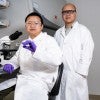
A research team led by Rice's Yang Gao has uncovered new insights into the molecular mechanisms of ADAR1.

A research team led by Rice's Yang Gao has uncovered new insights into the molecular mechanisms of ADAR1.

Rice Biotech Launch Pad and RBL LLC launch Rice Venture Creation Fellowship
The Rice Biotech Launch Pad is launching a Rice Venture Creation Fellowship, a program providing recent doctoral graduates passionate about innovation and startup development with training and resources.

Rice’s Gustavsson receives NSF CAREER Award to investigate dynamics of gene regulation
Rice’s Gustavsson has been awarded a National Science Foundation CAREER Award to advance her research on gene regulation dynamics.

Rice University and its Biotech Launch Pad today announced a peer-reviewed publication in Nature Communications detailing the development of a novel and rechargeable device — an electrocatalytic on-site oxygenator (ecO2) that produces oxygen to keep cells alive inside an implantable “living pharmacy,” potentially improving the outcomes of cell-based therapies.

Rice physicist Evelyn Tang is inaugural recipient of early career award
Rice theoretical physicist Evelyn Tang is an inaugural recipient of the Interdisciplinary Early Career Scientist Prize from the International Union of Pure and Applied Physics.
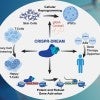
DREAM tool for gene therapies uses ‘locally sourced’ components
Rice bioengineers developed a tool that activates silent or insufficiently expressed genes using human-derived building blocks and a CRISPR-based genome-targeting platform.

Two Rice bioengineers win NIH Director’s New Innovator awards
Rice bioengineers Jerzy Szablowski and Julea Vlassakis received the NIH Director’s New Innovator Award for their respective research projects. Szablowski’s work seeks to develop a noninvasive method of mapping gene expression, while Vlassakis is studying complex, single-cell level processes and interactions in pediatric bone cancer.

NSF backs Rice processor design, chip security research
Rice computer scientists have won two grants from the National Science Foundation to explore new information processing technologies and applications that combine co-designed hardware and software to allow for more effective and efficient data stream analysis using pattern matching.

NIH funds new Baylor/Rice genome editing testing center
A five-year, $3.9 million grant from the National Institutes of Health will help establish a joint Baylor College of Medicine/Rice University center to support the development and testing of new genome editing technologies.
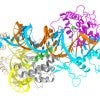
Tiny CRISPR tool could help shred viruses
Rice scientists mapped out the three-dimensional structure of one of the smallest known CRISPR-Cas13 systems then used that knowledge to modify its structure and improve its accuracy.
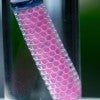
Feds fund $45M Rice-led research that could slash US cancer deaths by 50%
The Advanced Research Projects Agency for Health has awarded a Rice-led team $45 million to rapidly develop an implant with sense-and-respond technology that could slash U.S. cancer-related deaths by more than 50%.
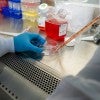
Split gene-editing tool offers greater precision
To make a gene-editing tool more precise and easier to control, Rice University engineers split it into two pieces that only come back together when a third molecule is added.

Protective particles allow engineered probiotics to report gut disease
Rice U. bioengineers developed a platform that enhances survival and function of probiotics engineered to diagnose inflammatory bowel disease in animals. The technology holds promise for minimally invasive disease monitoring and advanced smart therapeutics.

Rice chemist wins $3.2M National Cancer Institute grant
Rice University chemist Han Xiao has won a $3.2 million research project (R01) grant from the National Cancer Institute to develop the first tissue-specific epigenetic inhibitor drug to treat bone metastasis.

Reporters broadcast live, on-the-scene, inside living cells
Synthetic biologists from Rice University and Princeton University have demonstrated “live reporter” technology that can reveal the workings of signaling networks in living cells with far greater precision than current methods. The first-of-its-kind reporting tool can show how quickly signaling networks respond and how responses vary from cell to cell in time and space.